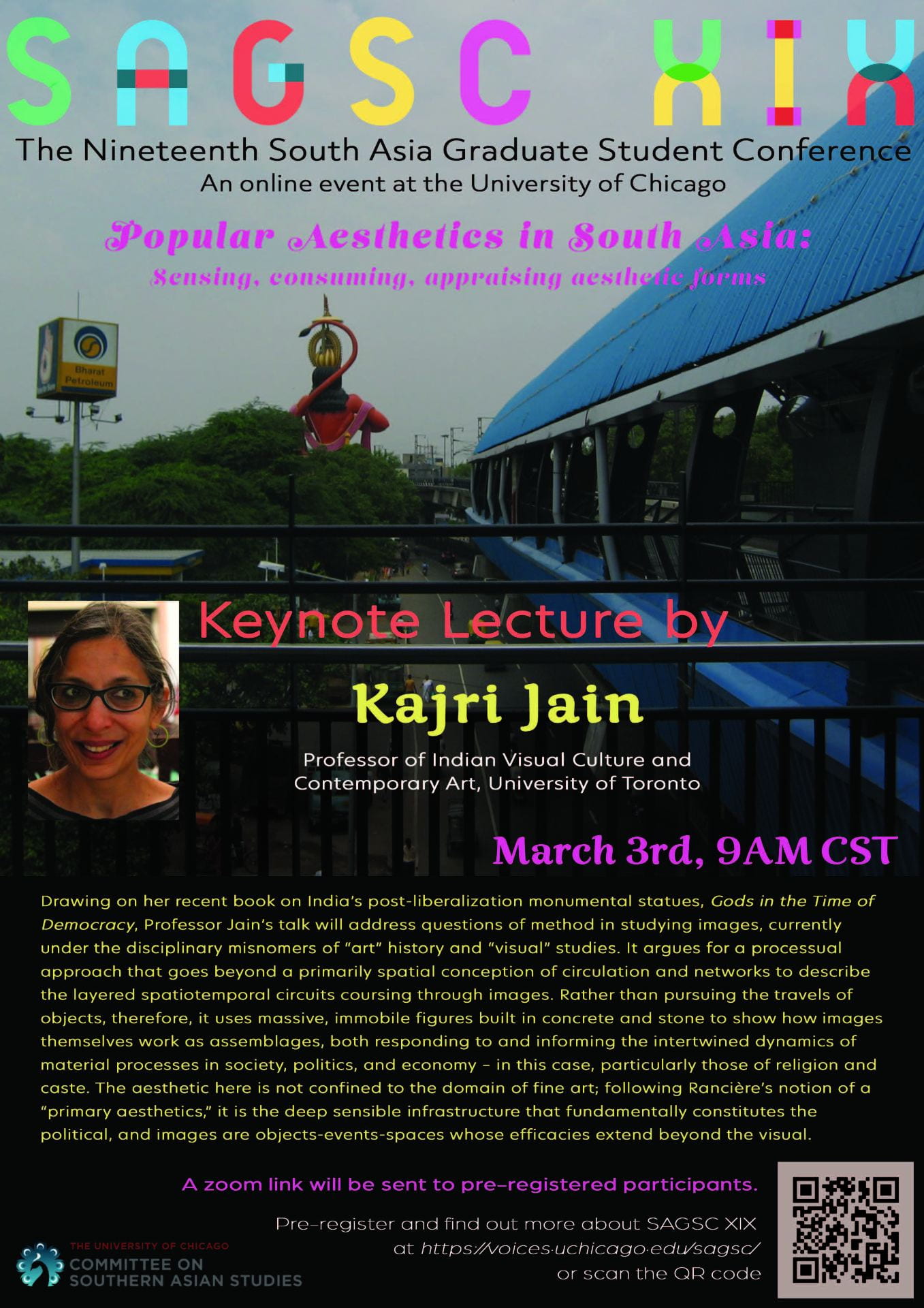The organizing committee of the Nineteenth South Asia Graduate Students Conference (SAGSC-XIX) is pleased to announce the 2022 conference, Popular Aesthetics in South Asia: Sensing, consuming, appraising aesthetic forms. The conference will take place remotely (via Zoom) on 3rd and 4th of March 2021. We invite graduate students from all disciplines of study, and at any stage of their graduate career to apply for this conference.
This conference foregrounds the centrality of aesthetics in the constitution of popular culture in South Asia. We invite papers that take up the aesthetics of not just cultural objects or subjective experiences of cultural engagement already framed as artistic in South Asia (i.e., ‘classical’ art forms) but extend such an analytic to experiences and objects of broad-based and everyday circulation and consumption. Be it a political speech, a popular literary or filmic genre, mass media artefacts, widely consumed goods and commodities, political movements, or everyday conversation, the poetics of their form and the forms of social life they give rise to is constitutive of their appeal. The emotions all such cultural forms elicit, the political significance they come to have make them objects of concern to a wide range of peoples in their everyday lives and to students of South Asia. Moral regimes like censorship, mass-mediated performances of regional/sub-national identity, widely circulating images driving human rights discourses–all of these alert us to the salience and importance of aesthetics across all domains of social life in South Asia.
Organizing Committee: Éléonore Rimbault, Ronit Ghosh, Shubham Shivang, Kartik Maini
Faculty Advisor: William T.S. Mazzarella, Neukom Family Professor of Anthropology and of Social Sciences in the College, University of Chicago
“Image as Process, Object as Assemblage”
Keynote Lecture by Kajri Jain, Professor in Visual Studies and Art History, University of Toronto (March 3, 9-10:30am)
Drawing on her recent book on India’s post-liberalization monumental statues, Gods in the Time of Democracy, Professor Jain’s talk will address questions of method in studying images, currently under the disciplinary misnomers of “art” history and “visual” studies. It argues for a processual approach that goes beyond a primarily spatial conception of circulation and networks to describe the layered spatiotemporal circuits coursing through images. Rather than pursuing the travels of objects, therefore, it uses massive, immobile figures built in concrete and stone to show how images themselves work as assemblages, both responding to and informing the intertwined dynamics of material processes in society, politics, and economy – in this case, particularly those of religion and caste. The aesthetic here is not confined to the domain of fine art; following Rancière’s notion of a “primary aesthetics,” it is the deep sensible infrastructure that fundamentally constitutes the political, and images are objects-events-spaces whose efficacies extend beyond the visual.
“On the Artfulness of the Everyday”
Artists’ Roundtable (March 4, 11:30am-12:45pm)
What is the relationship of art with the “popular”? How are we to think of the connections, mutual infiltrations, and rifts between art and everyday life? And how have artists explored these relations? What is the significance — social, political, cultural — of taking up the everyday for making art? These questions, among others, will animate this roundtable with artists and scholars of South Asia. The works of the artists present at the roundtable, the close attention to the everyday life of people manifest in their practice, provide new perspectives and invite us to question and reconsider the notion of the popular and the web of ideas that give it meaning. The roundtable will explore the practice of these artists and reflect on the ways in which they understand the significance of the everyday in their works.
Participants: Iftikhar Dadi (Artist & John H. Burris Professor, Department of History of Art and Visual Studies, Cornell University); Gurvinder Singh (filmmaker); and, Shabnam Virmani (musician, filmmaker)
Moderator: Rochona Majumdar, Associate Professor in Department of Cinema and Media Studies & Department of South Asian Languages and Civilizations, University of Chicago
